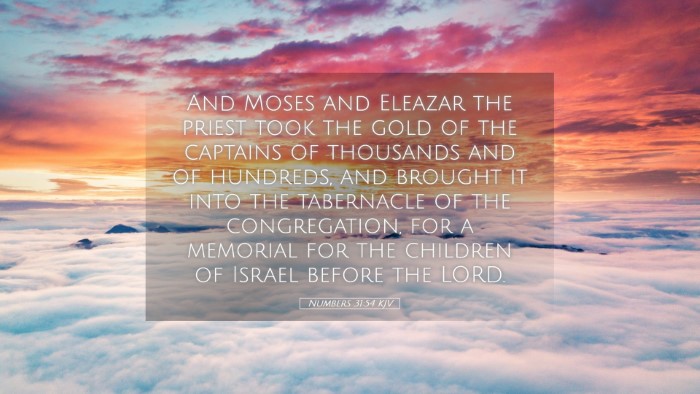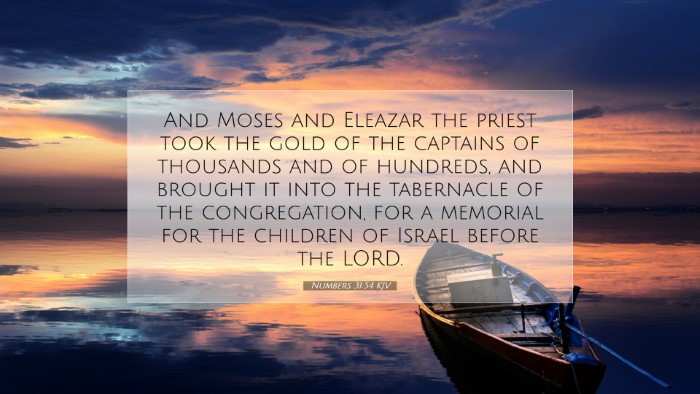Commentary on Numbers 31:54
Bible Verse: "And Moses and Eleazar the priest took the gold of the captains of the thousands and of the captains of the hundreds, and brought it into the tabernacle of the congregation, for a memorial for the children of Israel before the LORD." (Numbers 31:54)
Introduction
The verse in Numbers 31:54 captures a significant moment following the Israelites' victory over the Midianites. This passage conveys themes of thanksgiving, accountability, and the acknowledgment of God's providence. As we explore various commentaries, we can draw out rich insights that inform our understanding of worship, leadership, and sacrificial devotion.
The Context of Numbers 31
This chapter details Israel's campaign against Midian, a significant event in their journey towards the Promised Land. The destruction of Midian signifies divine judgment on idolatry and sin. After the conflict, the spoils of war are presented to God as an expression of gratitude and recognition of His hand in their victory.
Moses and Eleazar's Actions
In Numbers 31:54, Moses, along with Eleazar the priest, takes a pivotal role in presenting the spoils of war. This emphasizes a collaborative leadership that intertwines governance with spirituality. Their action serves not only as a collection of physical goods but also as a spiritual offering that embodies the corporate identity of Israel before God.
Insights from Matthew Henry
Matthew Henry notes the importance of dedicating the spoils of victory to God. For him, the actions of Moses and Eleazar illustrate a critical principle of life: that all successes and victories must be recognized as ultimately coming from God. Henry elaborates that the offering of gold represents the heart's desire to honor God, highlighting the necessity for accountability in leadership.
-
God's Sovereignty: Henry emphasizes that every victory is a result of God's sovereignty. The spoils serve as a reminder that success is intrinsically linked to divine favor.
-
Remembrance of God's Benefits: The offering acts as a memorial not just for the present but for future generations who will remember God's provision and protection.
Insights from Albert Barnes
Albert Barnes emphasizes the physical and spiritual dimensions of the act of offering. He states that the gold taken by Moses and Eleazar serves a dual purpose: to express gratitude and to function as a testament of what the Lord has done for Israel.
-
No Spoils Without Responsibility: Barnes remarks on the ethical responsibility that accompanies blessing; as leaders, Moses and Eleazar model how to direct blessings back to God.
-
Appeal to God's Remembrance: The memorial presented before the Lord serves as an appeal to His graciousness, ensuring that their actions and gratitude resonate throughout the history of Israel.
Insights from Adam Clarke
Adam Clarke provides additional layers of understanding regarding the significance of the gold and the method in which it was collected and presented. Clarke examines the motivations behind presenting the captains’ offerings, considering their roles as leaders and how they ought to lead by example.
-
Symbolism of Gold: Clarke interprets the gold not merely as wealth but as a representation of the glory and purity that should characterize both the offering and the worshipper.
-
Spiritual Leadership Accountability: He highlights the dual call of leaders to both collect and consecrate. The act of bringing the spoils into the tabernacle elevates the importance of spiritual leadership in matters of worship and finance.
Theological Reflections
The act of dedicating the spoils to God in Numbers 31:54 engages core theological tenets of worship, stewardship, and community remembrance. This moment evokes robust questions about how contemporary leaders manage blessings and victories while ensuring that God receives glory.
-
The Principle of Acknowledgment: Just as Moses and Eleazar recognized God's hand in their victory, today's believers are called to acknowledge God's providence in all areas of life, especially in successes and victories.
-
Community and Participation: The communal aspect of the offering encourages a collective identity focused on worship and remembrance, suggesting that corporate worship should be at the heart of community life.
Practical Applications
The implications of Numbers 31:54 extend into modern church practices and personal faith journeys. As leaders and congregants, reflections on this passage can inspire actionable changes.
-
Emphasizing Gratitude: Pastors should inspire congregations to express gratitude in tangible ways, recognizing God’s provision not only through prayer but through acts of service and offerings.
-
Educating on Stewardship: It invites discussions around how wealth and resources are perceived within the church, fostering an ethic of sharing and sacrificial living in alignment with scriptural values.
Conclusion
Numbers 31:54 stands as a powerful reminder that all blessings and victories originate from the Lord, necessitating a response of thankfulness and stewardship. By examining the insights of Matthew Henry, Albert Barnes, and Adam Clarke, we reveal a depth of understanding that enriches our worship and commitment to God. May we be inspired to lead lives that honor such a legacy of gratitude and accountability, rooted in our covenant relationship with God.


